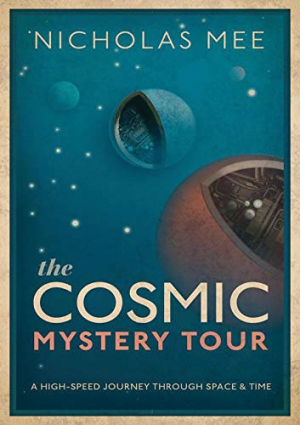The Cosmic Mystery Tour
A High-Speed Journey through Space & Time
Neutron. Photon. Hydrogen. Helium. Gravity. Strong forces. Dark matter. Black hole. These are some of the major players in our universal theater, and yes, there’s a fair bit of complexity to the system. Even so, shouldn’t we spend the time needed to understand how the warmth of the sun is created, why our planet doesn’t spin off into deep space, if the Big Bang Theory plausibly explains how the universe was created, among other questions? This is our home, after all, and it’s a fact that the atoms in our bodies and everything else around us were created in the intense heat and explosions of stars. What else is more important to learn than that, for heaven’s sake?
Nicholas Mees, in his brilliant The Cosmic Mystery Tour: A High-Speed Journey through Space & Time, offers a chapter-by-short-chapter assemblage of the theories, discoveries, and general relativity-type great leaps of inspiration that account for the impressive amount of knowledge we have about the universe. With an on-the-shoulders-of-giants approach, he lightheartedly dances from Isaac Newton’s great understanding of gravity and light to Thomas Young proving that light was wave-like to Louis de Broglie’s notion that light and, indeed, all matter somehow have the characteristics of both particles and waves to Faraday, Maxwell, and then Ernest Rutherford discovering the nucleus of an atom to Einstein doing his supernaturally astounding things—onward, upward, inexorably forward to other prominent current-day scientists. Refreshingly comprehensible, for the subject matter, this project is a delight.
Reviewed by
Matt Sutherland
Disclosure: This article is not an endorsement, but a review. The publisher of this book provided free copies of the book to have their book reviewed by a professional reviewer. No fee was paid by the publisher for this review. Foreword Reviews only recommends books that we love. Foreword Magazine, Inc. is disclosing this in accordance with the Federal Trade Commission’s 16 CFR, Part 255.


